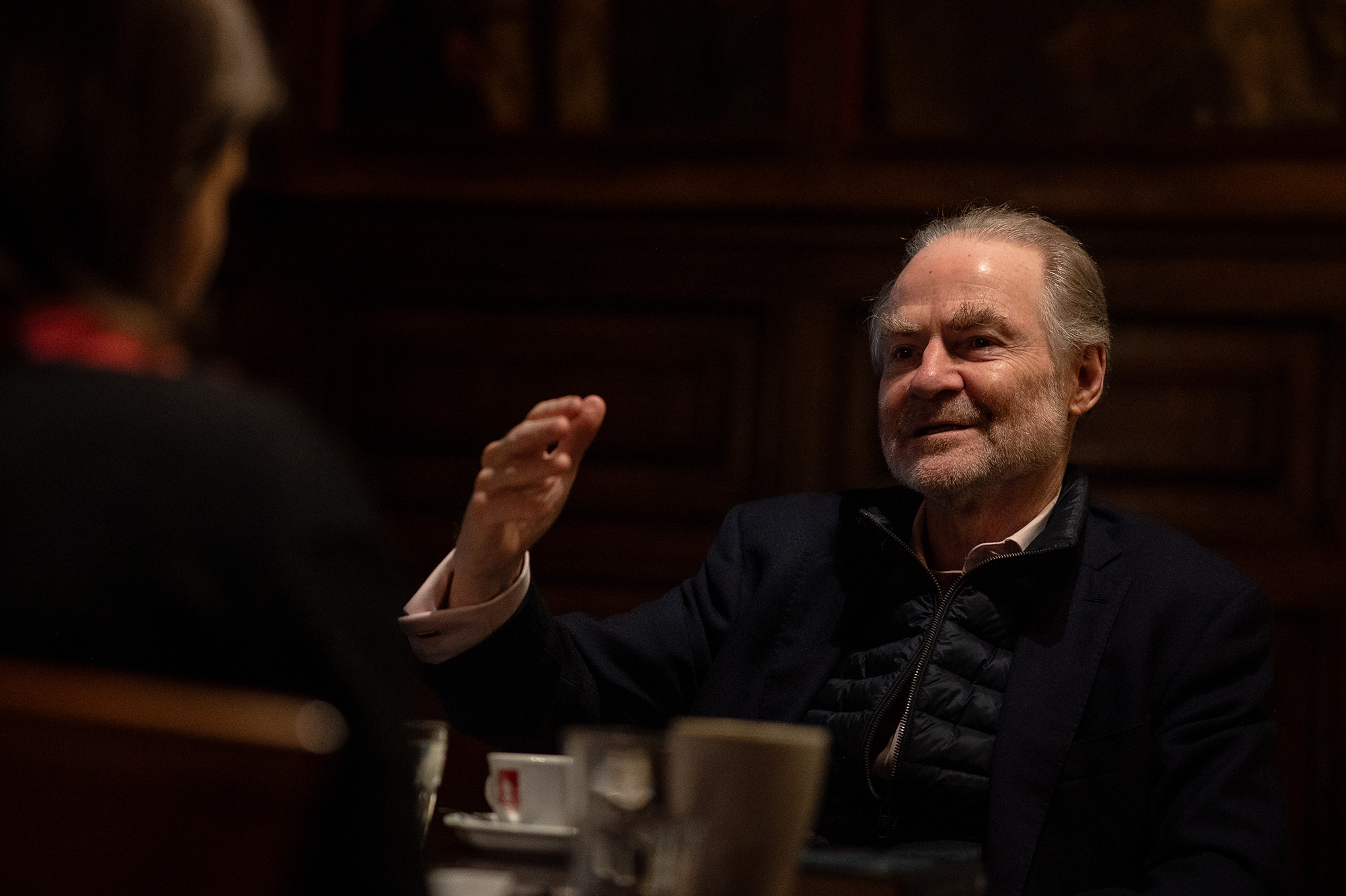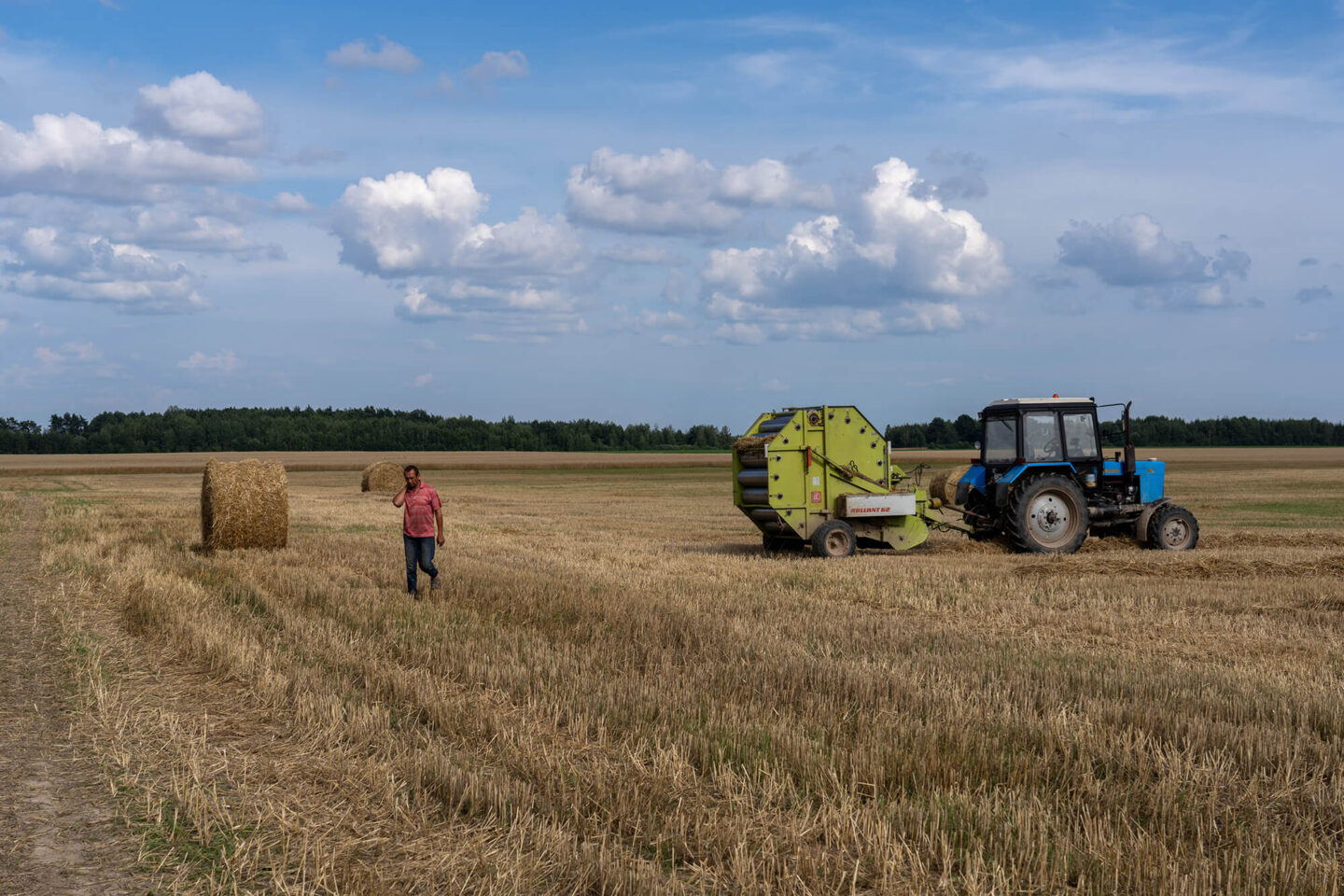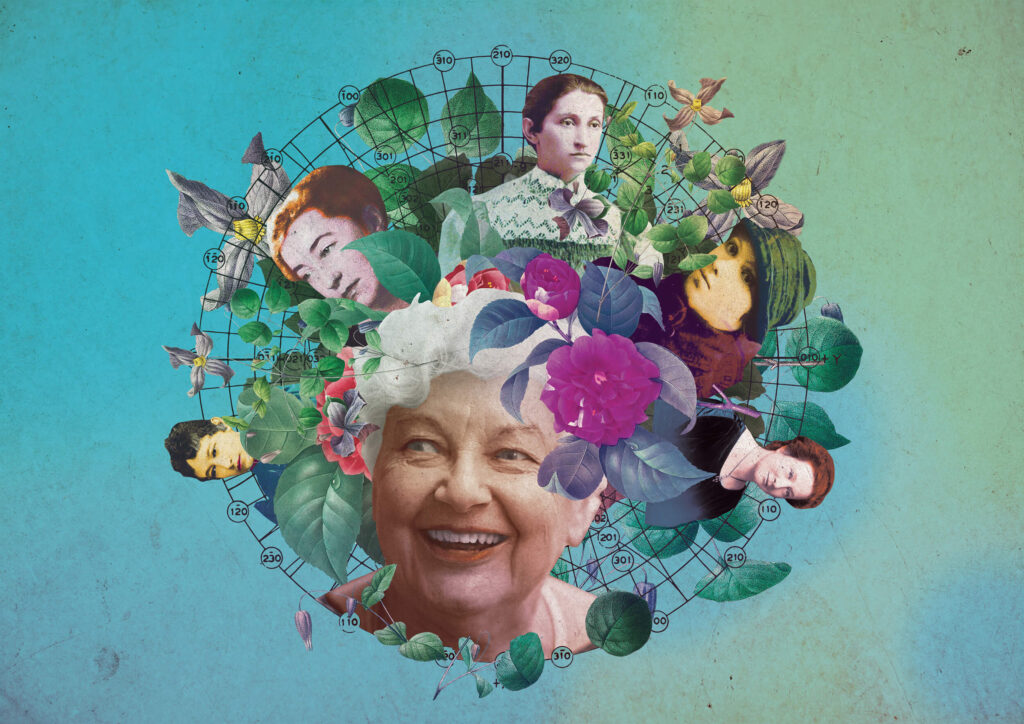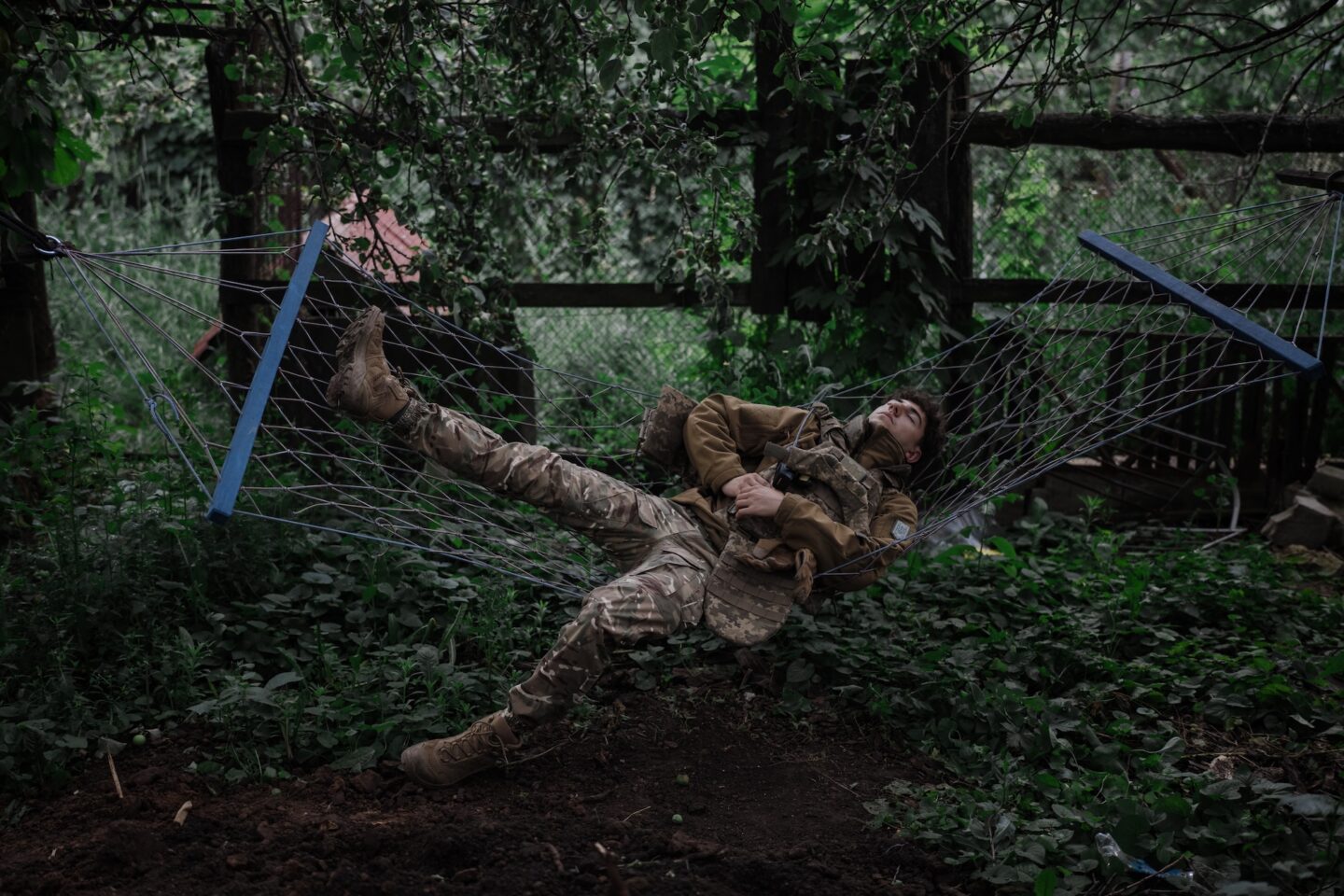Timothy Garton Ash, a renowned historian and mentor to Timothy Snyder, is best known for his work on communist regimes, the Stasi secret police, the 1989 revolutions, and the transformation of post-Soviet Eastern Bloc countries. In his book Native Soil, published in Ukrainian in 2024 by Vivat Publishing House, Garton Ash reflects on his life, shares conversations with European leaders and ordinary people, recounts his travels, and pieces together memory and experience to trace Europe’s trajectory from the Second World War to the present. Still today, Garton Ash poses questions and searches for answers: What does the future hold? How will Russia’s full-scale invasion of Ukraine reshape Europe?
A specialist in the history of Central and Eastern Europe, he heads the Centre for European Studies at Oxford University and co-authored one of the modern “Marshall Plans” for providing aid to Ukraine. He donated from his Lionel Gelber Prize to support the Ukrainian Armed Forces, and, in partnership with the Come Back Alive Foundation, helped equip a rifle battalion with drones and night vision equipment. Since 2022, he has visited Ukraine seven times. This time, he came to speak at the Lviv Media Forum, held under the theme “Speak the Unspoken” (in Ukrainian: “Calling things by their names: choice, decision, responsibility”). We met at Atlas Café in Lviv to talk about the cartography of Europe, the catching-up revolutions, and the geography of change.
§§§
We recorded this conversation at LMF 2025 — one of the largest media conferences in Central and Eastern Europe.
§§§
In Native Soil, you write that your father, who served in the British Army and landed in Normandy, used the word “Europe” to mean only France, and that the word “Europe” in a broader sense seemed to him to be some kind of insidious trick. As you say, it is impossible to understand modern Europe without referring to the period that Tony Judt called the ‘post-war era.’ Why was there a need to form an association such as the European Union?
Because 80 years ago, Europe was hell. Sixty million people were dead. Millions more were wounded, displaced, deported, or left to waste away in camps. Cities were reduced to rubble. We created hell on earth. In my book, I illustrated this through two small villages: one in Northern Germany, the other in what is now Poland. These villages reflect every aspect of that hell. Everything we’ve done in Europe since then has been driven by a single goal: to build something better, and to ensure we never return to that hell.
That is why 24 February 2022 is a defining date in European history, because that is when we collectively returned to hell en masse. Yes, we have already been through this in Bosnia, in the former Yugoslavia, but now it has happened for real and has been going on for over three years. Thus, the hell of 1945 and the hell Ukrainians are experiencing today, especially in the east, are the bookends of this era.
In the 1950s, it all started with just six countries creating the European Economic Community, but the union kept evolving and growing. You’ve witnessed and documented many phases of this history.
One chapter in Native Soil is titled Kaleidotapestry, capturing Europe’s diversity. How was it possible to bring such different, once-hostile nations together under a shared vision?
That’s the big question:how united are we, really? Even today, the question of how united we really are remains. I think one crucial thing is overlooked: this wasn’t just a story about Britain, France, or West Germany, it also involved the United States.
For 80 years, we were incredibly fortunate to have what was, essentially, a benevolent hegemon guaranteeing our security.
That was the first major step. The second was that people across the continent, and I mean all of Europe, not just the EU, collectively said: We’ve been through hell. We’ve lived through devastation. We want something better. And that “something better” is Europe. That aspiration gave rise to what I call the engine of memory — the deep drive toward unity.
We implemented this through the Council of Europe, which was quite important in the early years. We implemented it in what later became the European Economic Community. We implemented it in NATO. But the most important thing was that there was a determined will to move from a bad past to a better future.
Standing on the ground where your father once walked in Westhem, Germany[2] , you began a journey that stretched over more than a decade. You learned German, made it to East Germany, and were even accused of espionage by the Stasi. Did you feel this dichotomy between ‘us’ and ‘them’? How did your experience in Germany change you?
Sitting here in Atlas Café in Lviv, I can say it again: I am a Central European. You couldn’t find a more Central European setting than this café. Indeed, the places that shaped my idea of Europe weren’t Britain or France, they were Berlin, Prague, Warsaw, and Budapest. First came Germany: a country that had once plunged the world into hell and was now trying to rebuild itself into something better. Then came the shocking realization that, just across the Berlin Wall, people were still living under dictatorship. And after that, I discovered Poland, Czechoslovakia, Hungary. These experiences became decisive in my life.
And yes, perhaps a sense of alienation really does help a writer or intellectual, and it was probably my British origins that gave me that seed of alienation.
But fundamentally, I felt completely aligned with my friends in Central Europe. And I was extraordinarily lucky; it was pure chance to live during the same ten-year period when Central Europeans themselves began to liberate their societies: the Poles, the Czechs, the Hungarians and the others.
You write that when the Iron Curtain fell, a new Europe emerged. The countries of the Eastern Bloc fought for freedom — and won. Poland had Solidarity, East Germany saw the Leipzig miracle, Czechoslovakia had the Velvet Revolution, and similar uprisings unfolded in Hungary, Bulgaria, Albania, and Yugoslavia. In Ukraine, there was the Revolution on Granite. How do you see these processes fitting into the formation of a new Europe?
What’s crucial is that every person feels they are the author of their own life — and the same goes for nations. It matters deeply that countries feel they achieved their freedom themselves, that they liberated themselves. Poland is a great example. It was a pioneer — from the Solidarity movement in August 1980, through the turbulent 1980s, to the breakthrough of 1989. And afterward, there was this powerful sense: We did it. We freed ourselves, despite everything.
I see Ukraine’s path in a similar way. The German philosopher Jürgen Habermas once described 1989 as a «Die nachholende Revolution», a “catching-up revolution.” He meant that it was catching up with the democratic West. And I hope you won’t take this the wrong way, but I think Ukraine, too, has had its own form of catching-up revolution. There was a strong independence movement, of course, but formal independence came with the collapse of the Soviet Union. What followed was a series of national awakenings: the “Ukraine Without Kuchma” protests, the Orange Revolution, and then Euromaidan. You made that liberation your own — both personally and as a nation.

Just to clarify, are you referring specifically to the Orange Revolution? We also had the Revolution on Granite. It was smaller, but still…
Yes, I know. Both the Revolution on Granite and the “Ukraine Without Kuchma” protests were important. But they’re part of a slightly different narrative. You see, Solidarity in the 1980s directly led to systemic change in Poland. The Revolution on Granite, while deeply significant, especially for the formation of Ukrainian national identity and the vision of what Ukraine could be, didn’t immediately lead to independence. That came about as a result of the collapse of the Soviet Union. That’s what I meant earlier. And only then came a series of events through which Ukraine did shape itself.
For me, the key turning point was December 2004 — the Orange Revolution in Kyiv. I see that moment as the culmination of a 25-year wave of self-liberation revolutions, beginning with Solidarity in August 1980 and culminating in the events of 2004. By the way, during the Orange Revolution, I had the support of a very kind young man, Pavlo, the son of Yaroslav Hrytsak, who looked after me while I was in Kyiv. So for me, these events weren’t isolated. I saw them as part of a larger, shared arc of liberation across Central and Eastern Europe.
In your book, you describe a moment in March 1994. You were dozing off at a conference in St. Petersburg, when a short man stood up and said that “there are territories outside the Russian Federation that have historically always belonged to Russia.” That man was Vladimir Putin. Years later, in 2007, he openly declared his confrontation with the West at the Munich Security Conference. After Russia’s intervention in South Ossetia and Abkhazia in 2008, NATO responded neither militarily nor with sanctions. In an interview with ARTE, you said that nothing is inevitable and that everything can be changed. How do you assess the West’s silence in 2008, and what did it lead to?
I think we need to look at this in two distinct periods: the postwar period after 1945, and what I call the post-Cold War period, beginning with the fall of the Berlin Wall on 9 November 1989. Today, many people look back and say, “Oh, that was just a short break from history. Lost time. Illusions of the end of history.” But that simply isn’t true, at least not for the first half of that period, from 1989 to 2007. During that time, we accomplished extraordinary things. Half of Europe was liberated, transformed, and integrated into the West. Countries, including the Baltic states, became democracies. They joined two core Western institutions: the EU and NATO.
It was Ukraine’s unfortunate fate that their period of struggle to become a sovereign, independent European nation on the path to the West fell in the second half of this period, when everything went wrong. I get a bit lost in the wordiness here… there are several ways it could be reworded without losing the idea but this is how I felt it made most sense.
In that sense, nations like Poland or Estonia were lucky, because they moved with the current of history. Horrible disaster happened when Ukraine was forced to fight against that current. And here, we also need to acknowledge the West’s mistakes.
In the first half of the post-Cold War period, we didn’t make many major errors. There’s a whole narrative now that NATO enlargement was a mistake, but it was the right move. If only we had extended NATO membership to Ukraine in 2008… Just imagine where the Baltic countries would be today if they hadn’t joined NATO. They’d be in the same position as Ukraine. For me, 2008 in Georgia, and then Crimea and eastern Ukraine in 2014-2015, were the turning points the West failed to act on. If only we had recognised what was happening from the very beginning… But the sanctions imposed on Russia were extremely weak.
We should rearm. We should arm Ukraine. We should reduce our dependence on Russian energy instead of increasing it.
We should face the fact that Russia presents a long-term challenge.
I believe we could have been in a completely different situation today. The truth is, we only woke up on 24 February 2022, when in fact we should have woken up in 2008. Or at the very least, in 2014.

You have mentioned Jürgen Habermas. At the beginning of the full-scale invasion, he wrote in the Süddeutsche Zeitung article “War and Indignation” that “you cannot ‘win’ a war against a nuclear power,” implying that it would be easier for Ukraine to surrender. I would say that Germany, France, and even Great Britain were very cautious in 2022 and did not fully believe that Ukraine could stand up to such an empire. Now we see that the situation has changed, although we have suffered enormous losses and are experiencing a great tragedy. Why do you think, for example, that the Germans or Austrians did not see Ukraine on the conceptual map of Europe?
There are really two separate issues at play here. The first is the long-standing failure to recognise Ukraine as a distinct, sovereign European nation. A striking example is a statement by Helmut Schmidt in 2014, in which he said that Ukraine is an independent state of sorts, but not a true nation-state. That mindset wasn’t unique to him; it reflected a broader Western inability, for years, to fully acknowledge Ukraine’s identity. This has changed dramatically, of course, especially since the full-scale Russian invasion. Here, the varied reactions across Europe can be understood through each country’s historical experience of the Second World War.
You mentioned earlier that even the British didn’t quite believe in Ukraine’s chances, and perhaps that’s true, but what mattered more was the instinctive emotional reaction. For many in the UK, it felt like 1940 all over again: a country standing alone against a tyrant. The response was immediate — we’re with the people of Ukraine and fighting for freedom. And, as you remember, military support and assistance from the British began even before the full-scale invasion, right? So, for us, it was self-evident, like a lesson from history.
In France, there was a different kind of self-awareness. In Germany it was the most unusual. There, the dominant postwar idea was that the greatest evil was not dictatorship or aggression — but war itself. Peace became the ultimate moral good, particularly in the context of nuclear powers. It was a flawed understanding of peace, but one that was deeply ingrained. And it took more than three years of brutal war for that attitude to begin to shift.
This brings me to Jürgen Habermas. He’s an extraordinary thinker and a foundational democrat of postwar Germany, but he belongs to his time. When he wrote his article, he was over 90. And one of the conclusions I have come to is that at a certain age, it is probably better to remain silent. Simply because it is inevitable that your ideas will remain the ideas of your time. Habermas was a man of the Cold War who thought about nuclear Armageddon. And so his argument was that you, Ukrainians, should remain silent and simply accept this, because otherwise the end of the world would come.
We’re currently witnessing a rise in far-right movements across Europe: the AfD in Germany, Marine Le Pen’s National Rally in France, as well as similar trends in Italy, Hungary, and beyond. In 2013, the AfD couldn’t even cross the five percent threshold in parliament; now it polls above 20 percent. How dangerous do you think this trend is?
There has always been tension in Europe between liberal and anti-liberal forces. Throughout modern European history, we’ve seen waves of integration and disintegration. But I don’t think the forces of liberalism and anti-liberalism or unity and fragmentation have been so finely balanced since 1945. And honestly, I don’t know where it’s going. That’s how serious the situation is. It’s up to us collectively to determine which path to take.
We are still moving forward towards liberal integration. After the COVID-19 crisis, we saw the launch of the NextGeneration EU recovery fund, a huge step toward greater European integration. In response to Russia’s full-scale war on Ukraine, we’ve taken serious strides to strengthen European defence. There’s a real push to make Europe more cohesive, more capable, and more united in defending our values. But, my Lord, the forces of disintegration are alarmingly powerful.
We have Hungary, a full EU member state, which can no longer be considered a democracy. That’s a shocking reality and one that should never have been allowed to happen. We have Slovakia: its leader, Robert Fico, is going to sit beside Vladimir Putin and Xi Jinping in Red Square on May 9. In Romania, a nationalist, radical right-wing presidential candidate is not just Eurosceptic — he openly wants to end military aid to Ukraine. In Germany, the AfD, officially recognised as a far-right party, is now the main opposition force in the Bundestag. According to the latest polls, it has support from nearly a quarter of voters nationwide.
That is truly alarming. If Marine Le Pen hadn’t been disqualified, there’d be a real chance of her becoming the president of France in 2027. The same goes for Nigel Farage in the UK.
So how do we understand this? We are not just at a critical moment; we’re living through a critical era in European history. Within the next few years, perhaps by the end of this decade, we will know which direction Europe has taken. The same applies to Ukraine. Your fight and Europe’s fight are deeply connected.
You can only win the war and secure its place in a liberal, democratic Europe, if Europe itself holds together. If liberal integration fails here, it will accelerate disintegration elsewhere. And the same is true in reverse. This is a defining struggle — and it’s one that depends entirely on us.
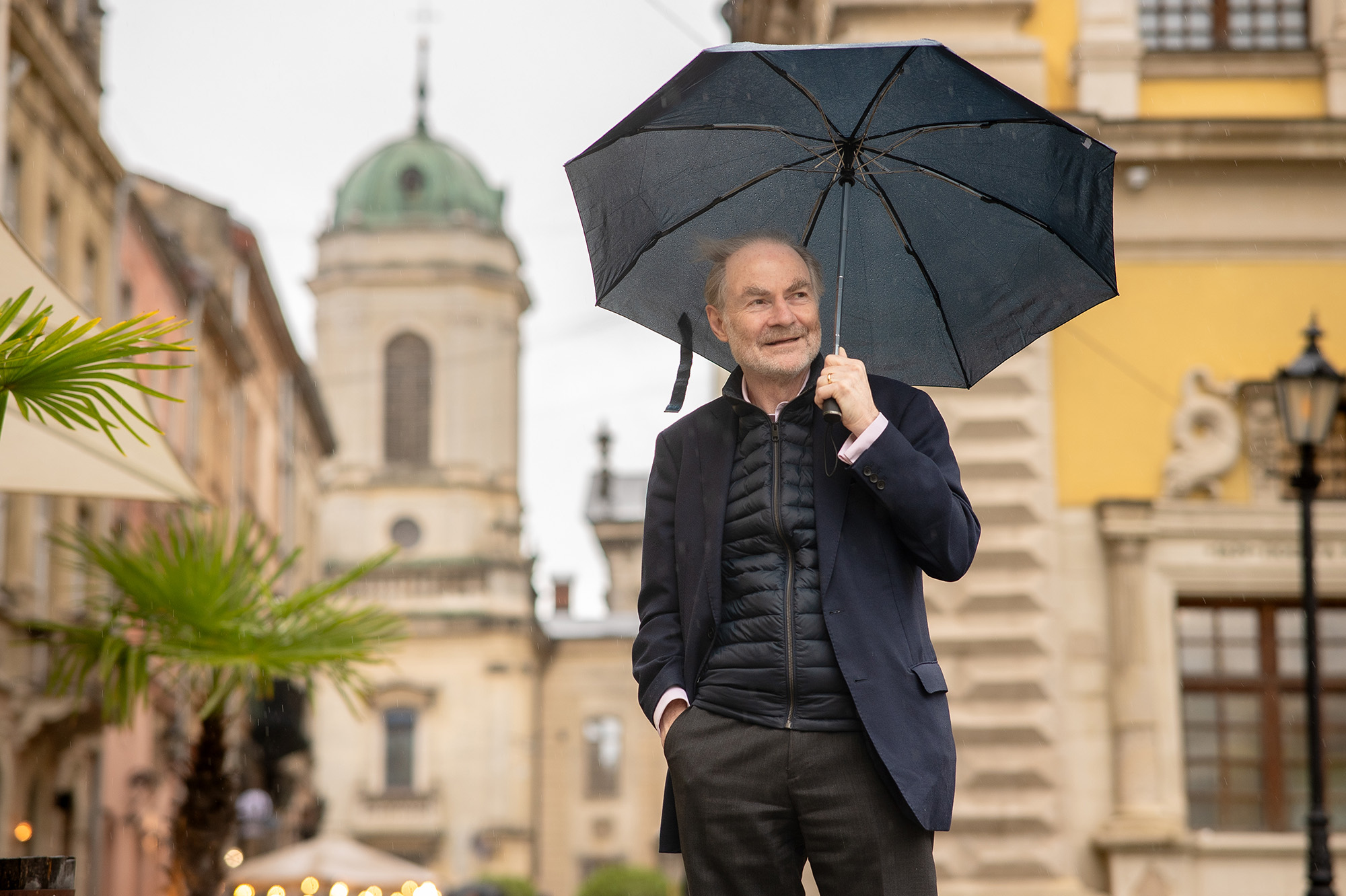
Donald Trump’s rise to power disrupted the established rules of the geopolitical arena. It now seems clear that America’s unconditional support and protection of Europe may come to an end. How should Europe respond to this shift?
Well, first of all, since 24 February 2022, we’ve experienced what I call three shocks: the Putin shock, the Xi shock, and the Trump shock. Everyone understands the Putin shock. We don’t need to explain that. But the Xi Jinping shock is equally important and often overlooked. It revealed that there are a number of powerful middle powers — China, yes, but also India, Turkey, Brazil, and South Africa — that are perfectly content to continue doing business with Russia, even as it wages a brutal, neocolonial war in Ukraine. And these countries are rich and powerful enough to stand up to the West. That’s the second shock: the one people forget about. A year ago, I might have said: We live in a post-Western world, but at least the West still exists. Today, I’m not sure I can even say that anymore.
Does the West still exist as a geopolitical player? No, because Trump behaves more like Narendra Modi [Prime Minister of India — Aut.] or a Star Wars character who has turned to the dark side, much closer to Vladimir Putin than to Volodymyr Zelenskyy, and this is absolutely shocking. So we are left on our own.
And I think that European leaders have understood this. We now have to take full responsibility for our own future.
That begins with the defence of Ukraine, because it is the front line of this broader struggle. But it doesn’t end there. We have to build our own security architecture across all dimensions: military, of course, but also economic, digital, and democratic.
We need to protect the integrity of our elections, which are being targeted and manipulated by outside forces, not just Russia, but China as well. As the French say, L’Europe est une puissance — Europe is a power. This is a long-term challenge.
The forces of nationalist, anti-republican disintegration are growing stronger, and today they’re supported not only by Moscow, but also by Washington. That’s the battle we’re facing.
You’ve been to Bucha, spoken with people affected by the war, and witnessed firsthand the atrocities committed by the Russian army on Ukrainian soil. Many historians call this the worst war in Europe since World War II. We also hear increasing talk of a potential Third World War. Do you agree with those comparisons?
I’ve been to Ukraine seven times since 2022. This is my seventh visit. And of course, I will never forget Bucha and Irpin. The extent of the brutality there has left a mark. But perhaps the most unforgettable experience for me was in Kharkiv, just a few weeks before the Factor Druku printing house was hit by a missile strike. I visited that printing house. What they’re doing is nothing short of heroic, they are continuing to work just steps away from the front line, under constant threat.
As for historical comparisons, I have no doubt: Vladimir Putin is the closest figure we’ve seen to Adolf Hitler since 1945. No, it’s not the same; things never repeat exactly, but it’s the closest parallel we’ve had. And this is, without question, the largest war in Europe since the Second World War. The scale of the violence and horror is staggering.
The stakes are much higher than in Bosnia, where terrible crimes were also committed, which we must remember.
At the same time, one crucial difference stands out. The Europe that Hitler sought to dominate was weak, fragmented, and half of it was already under fascist rule.
Today’s Europe is stronger. It’s large, wealthier than ever, and, most importantly, more united than it’s ever been. The European economy is twelve times larger than Russia’s. And this Europe has the political will to defend itself and its values.
While the nature of the threat may resemble that of the 1930s and ’40s, the balance of power is very different.
In recent decades, Europe has often seemed weak. Do you believe it’s capable of finding its strength now?
Absolutely.
